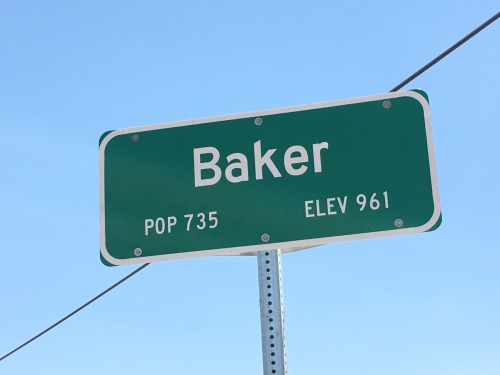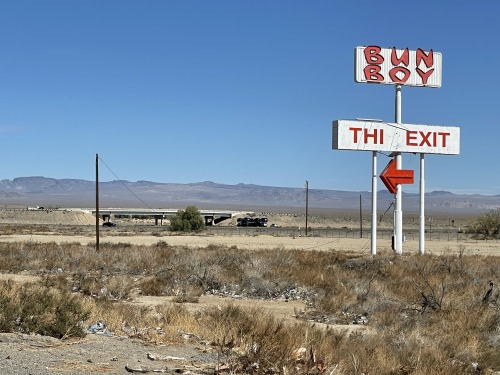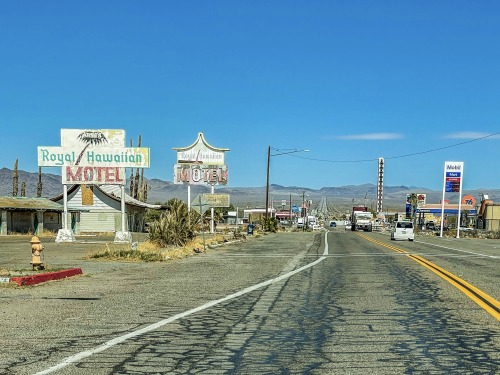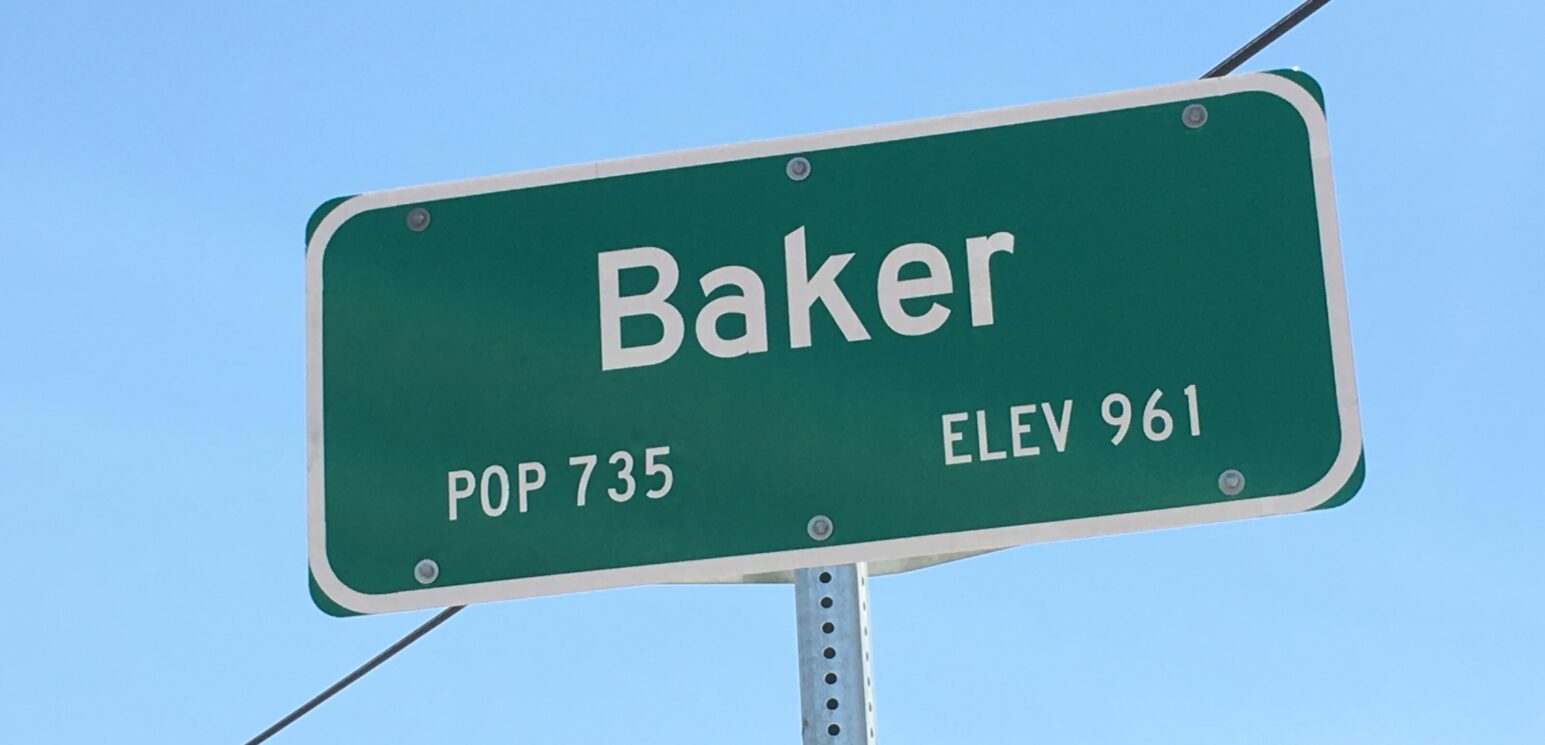I will never forget climbing the Baker Grade. It was my teacher, my master that torrid June morning, my silent Yoda that spoke to me in ways that only my brain could hear. But more on that in a sec. I’m getting in front of my pedals.
We had married in 1986 in Indianapolis, where first wife was living. I was located an hour down the road in Bloomington, where I was in grad school. Having met on a Spring Break bicycle journey to Florida, and subsequently acquiring a deep and abiding passion for long-distance cycling, we decided that we would have a Honeymoon On Wheels, from LA to Boston.
A week after the wedding, and upon finishing my summer term teaching obligations at Indiana U, we packed up our bikes and panniers in sturdy boxes, drove to my parents’ place in Chicago, and flew out the next day to sunny southern California. We retrieved our stuff in baggage claim, pulled everything off to a quiet corner, and reassembled our bikes.
Once the panniers—many people call them saddle bags—were attached onto front and rear racks containing 40 pounds of gear, we literally rolled out of the airport. Off we went straight to the Pacific where we dipped our wheels, and then headed east. There would be no looking back…at least not for a few days.
What fun! Oh, to be young again! I was 27, and she was 24.

Getting out of LA was no small task, even nearly 40 years ago. Three days of cycling finally found us in Barstow, a desert outpost bisected by old Route 66, and where I-40 breaks off I-15 on its own easterly journey. Now that we were out of the city and away from the cooling ocean waters, we noticed it was getting pretty hot. Day 4 would find us wisely pedaling only 60 miles straight up the 15 to Baker. It was along that stretch we also learned the desert is not flat, not even remotely close, with many very slow grinds that were seldom more than a 2% grade, but went on forever.
The weather forecast reported the next day would reach about 118 degrees, which quite frankly scared the hell out of us. We had wisely brought front and rear lights, so we hatched a plan to arise at 4am, grab a quick breakfast at the Bun Boy restaurant out front, and then get back on the freeway. We could already see the Baker Grade just east of town, an 18-mile crawl.

It was on the morning of Day 5 that my Yoda spoke to me. Imagine 40 pounds hanging off your bike. Imagine the dusty, dry 90-degree air leaving your voice sounding like a fog horn. Imagine the constant traffic whizzing by. And imagine barely hitting 6mph on your digital speedometer. We had to maintain such focus that we didn’t even talk to each other.
Yeah. It felt like we would fall over, that we couldn’t possibly be making any progress. I could almost count the beer cans littering the side of the highway.
It was not until about two hours into the ride that I dared look back, the sun now climbing high into the sky and the temperature starting to soar. When I did, I saw my wife close behind. But then I saw a tiny speck of a town in the distance. It was Baker, where we had spent the night. Not only did it look afar, it was much lower than where we were. In spite of the fact that our progress had hurt like hell, we were actually getting there, one pedal stroke at a time.

Our spirits soared, and the next six miles went by a lot faster, even if only in our minds. We knew that we were making it. Changes in latitude—and attitude—often come slowly. But when they do, they have long-lasting implications. We made it across the country—53 days and 3730 miles to Boston. To this day, even though the marriage didn’t last, our memories have, not to mention the enormous confidence boost we both gained by tackling this epic ride.
Which—drumroll, please—gets me to my point. The attitudes we have as humans, as shoppers, can and do change, but usually only over time. Technically, an attitude is a learned predisposition to consistently respond to a stimulus. That stimulus can be a product, a company, a country, a religion, political party, even an idea. Once we develop an attitude toward something, our behavior tends to become pretty predictable. And…here’s the connection to the bike trip—we usually don’t realize changes until we look back over our shoulder. It is then we see just how far we have come.
According to Google AI, “Changing attitudes involves altering your evaluations, feelings, or beliefs about a subject through methods like social influence, persuasive communication, or changes in personal experience and information.”
I suspect that even while the majority of my students are 20-24 years of age, you have still lived long enough to have seen some change in your attitudes toward the many stimuli in your lives. I know I sure have.I am no longer affiliated with any political party.
I am no longer affiliated with a church, and while I recognize that most of my friends and family have some affiliation, I am no longer interested in any of them (the churches, not the humans!). I don’t have any problem with gay marriage or any of the other letters in that well-known acronym. I do not care about the country of origin of the things I buy, instead looking for the best value for my dollar. And I don’t boycott anyone or any business unless they simply do not have what I want.
Oooh…I just said that word. Does a person’s boycott signify an attitude change? I am not convinced it does. I am betting it is still a short-term reflex. Come back in a year and let’s see which beer you’re drinking, which stores you shop, and so forth.
One of the hardest things I have had to deal with is people close to me saying, “You have changed,” as if that were a bad thing somehow. No. I explain that I am a work in progress, that I am not flip-flopping. Instead, my attitudes have changed because I have better, more complete knowledge. And knowledge acquisition is lifelong. I hope it is for you, too. Since I hope to live another 30 years to match my father, I wouldn’t be surprised if I change some more, rather than just allowing myself to become fossilized before my time.
If you have a problem with shades of gray, with nuance, then you’re probably not going to change much. If you need to live in a black and white world, you have probably already found those color anchor points. But if you embrace critical thinking and are comfortable parsing through ambiguity and new information, then you will become a different person.
Kind of like how we did back on Day 5 of the honeymoon. It was a day of metaphors lived out…mountains, desert, heat. In the end, we made it, but we emerged different persons.
Dr “Embrace The Change” Gerlich


